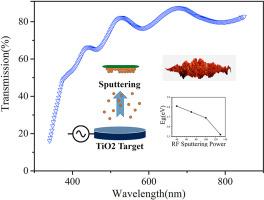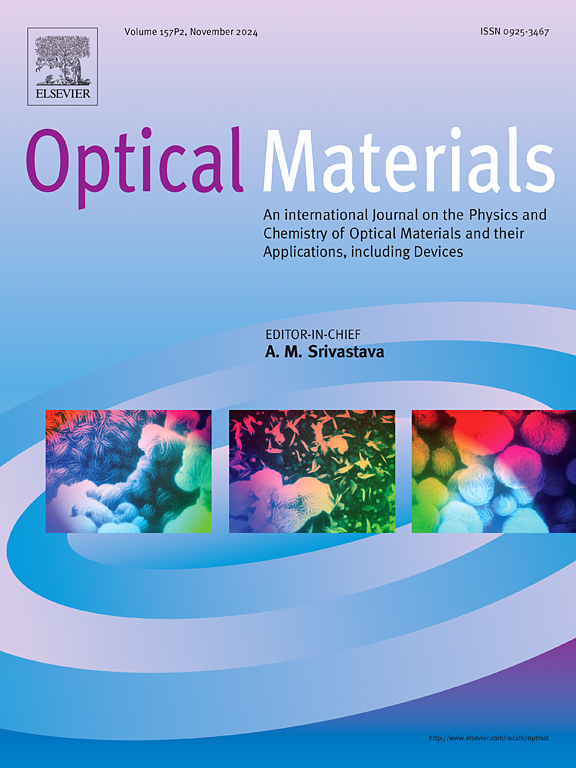研究射频功率对溅射二氧化钛薄膜表面形貌和光学特性的影响
IF 3.8
3区 材料科学
Q2 MATERIALS SCIENCE, MULTIDISCIPLINARY
引用次数: 0
摘要
在氩气环境下,使用射频(RF)磁控溅射技术在玻璃基底上沉积了厚度为 105 至 231 nm 的二氧化钛(TiO2)薄膜,射频功率分别为 40、70、100 和 130 W,沉积时间保持不变。利用 X 射线衍射 (XRD)、原子力显微镜 (AFM) 和紫外-可见透射光谱分析了所得薄膜的晶体结构、表面形貌以及光学和半导体特性。这些分析表明,薄膜的结晶度随着射频功率的增加而提高,这与薄膜厚度的增加相对应。因此,样品从低结晶或无定形结构转变为具有 (110) 纹理的单晶金红石相。然而,在所研究的最高射频功率下,这种纹理因不同取向的纳米晶体的形成而被部分破坏。表面粗糙度呈现多分形特征,随着射频功率的增加,复杂性系统性降低,表面硬度降低。折射率和光带隙能分别用 Swanepoel 和 Tauc plot 方法测定。随着射频功率的增加,薄膜的折射率明显增加,光带隙从 3.81 eV 减小到 3.52 eV。这凸显了射频功率对二氧化钛薄膜的光学和半导体特性的影响。本文章由计算机程序翻译,如有差异,请以英文原文为准。

Investigating the influence of RF power on the surface morphological and optical properties of sputtered TiO2 thin films
Thin films of titanium dioxide (TiO2), with thicknesses ranging from 105 to 231 nm, were deposited on glass substrates using radio-frequency (RF) magnetron sputtering in an argon atmosphere at four distinct RF power levels: 40, 70, 100, and 130 W, with the deposition time kept constant. The crystalline structure, surface morphology and optical and semiconductor properties of the obtained films were analyzed using X-ray diffraction (XRD), Atomic Force Microscopy (AFM) and UV–visible transmittance spectroscopy. These analyses revealed that the crystallinity of the films improves with increasing RF power, corresponding to an increase in film thickness. Consequently, the samples transition from poorly crystalline or amorphous structure to a monocrystalline rutile phase with a (110) texture. However, at the highest RF power studied, this texture is partially disrupted by the formation of nanocrystals with different orientations. The surface roughness exhibited multifractal characteristics, with complexity systematically decreasing and surface stiffness reducing as RF power increased. Refractive indices and optical band gap energies were determined using the Swanepoel and Tauc plot methods, respectively. The films exhibited a notable increase in the refractive index and a decrease in the optical band gap, from 3.81 eV to 3.52 eV, as the RF power was increased. This underscores the influence of RF power on the optical and semiconductor properties of TiO2 films.
求助全文
通过发布文献求助,成功后即可免费获取论文全文。
去求助
来源期刊

Optical Materials
工程技术-材料科学:综合
CiteScore
6.60
自引率
12.80%
发文量
1265
审稿时长
38 days
期刊介绍:
Optical Materials has an open access mirror journal Optical Materials: X, sharing the same aims and scope, editorial team, submission system and rigorous peer review.
The purpose of Optical Materials is to provide a means of communication and technology transfer between researchers who are interested in materials for potential device applications. The journal publishes original papers and review articles on the design, synthesis, characterisation and applications of optical materials.
OPTICAL MATERIALS focuses on:
• Optical Properties of Material Systems;
• The Materials Aspects of Optical Phenomena;
• The Materials Aspects of Devices and Applications.
Authors can submit separate research elements describing their data to Data in Brief and methods to Methods X.
 求助内容:
求助内容: 应助结果提醒方式:
应助结果提醒方式:


